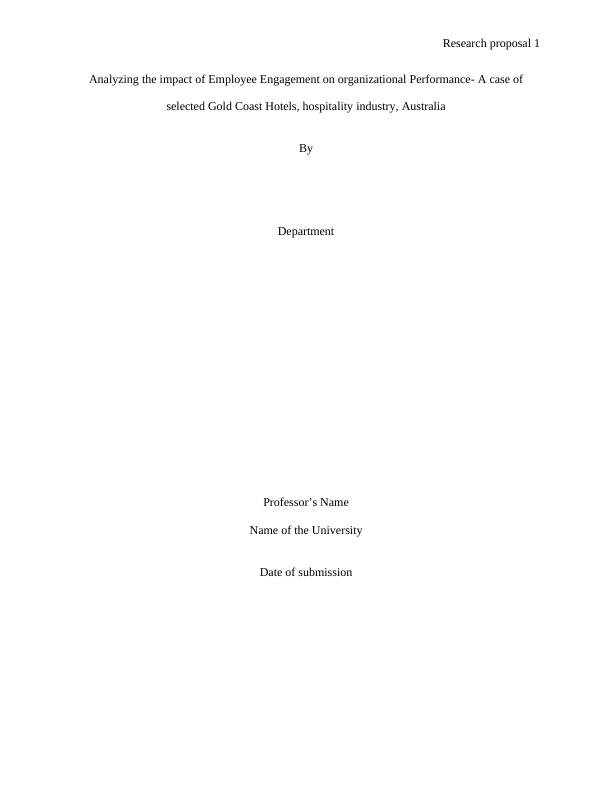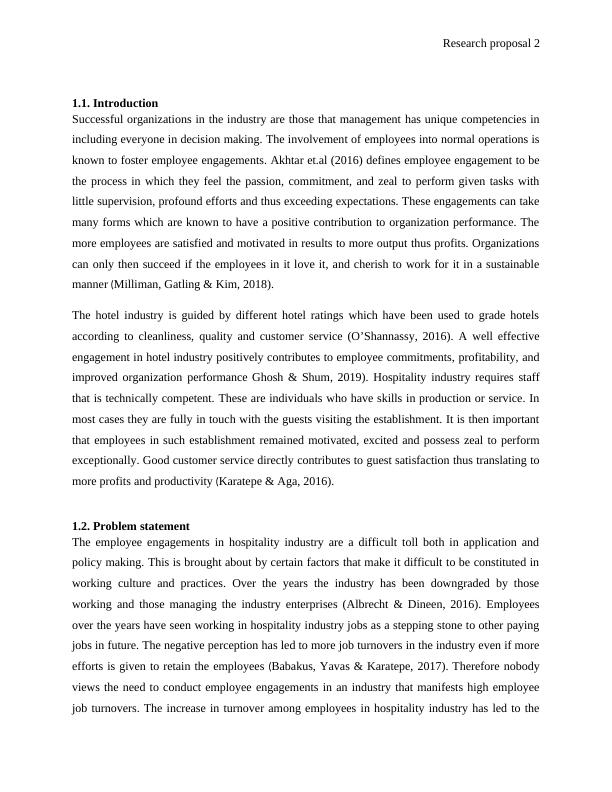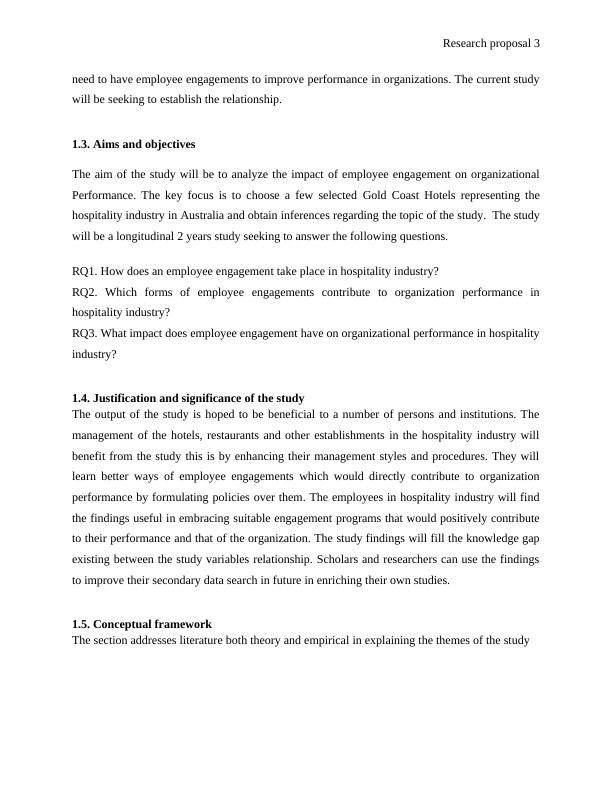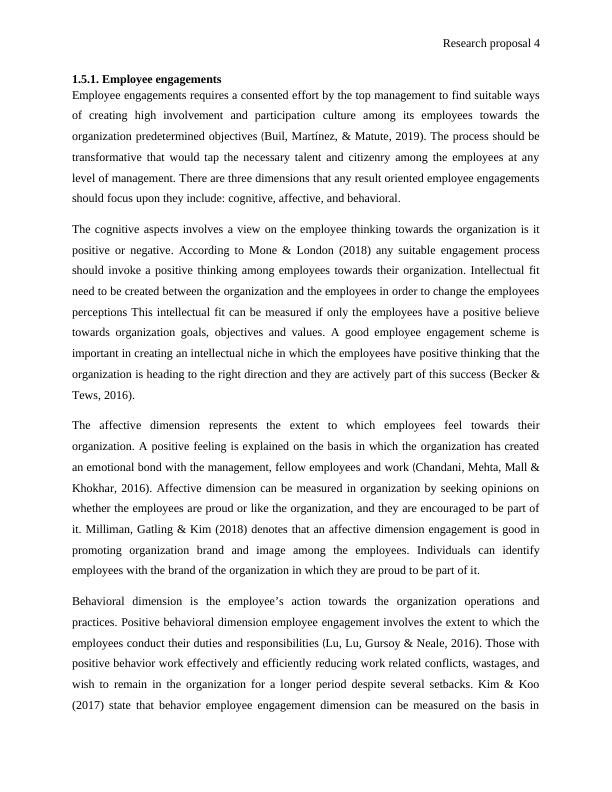Analyzing the Impact of Employee Engagement on Organizational Performance
Added on 2023-04-03
17 Pages3920 Words339 Views
Research proposal 1
Analyzing the impact of Employee Engagement on organizational Performance- A case of
selected Gold Coast Hotels, hospitality industry, Australia
By
Department
Professor’s Name
Name of the University
Date of submission
Analyzing the impact of Employee Engagement on organizational Performance- A case of
selected Gold Coast Hotels, hospitality industry, Australia
By
Department
Professor’s Name
Name of the University
Date of submission

Research proposal 2
1.1. Introduction
Successful organizations in the industry are those that management has unique competencies in
including everyone in decision making. The involvement of employees into normal operations is
known to foster employee engagements. Akhtar et.al (2016) defines employee engagement to be
the process in which they feel the passion, commitment, and zeal to perform given tasks with
little supervision, profound efforts and thus exceeding expectations. These engagements can take
many forms which are known to have a positive contribution to organization performance. The
more employees are satisfied and motivated in results to more output thus profits. Organizations
can only then succeed if the employees in it love it, and cherish to work for it in a sustainable
manner (Milliman, Gatling & Kim, 2018).
The hotel industry is guided by different hotel ratings which have been used to grade hotels
according to cleanliness, quality and customer service (O’Shannassy, 2016). A well effective
engagement in hotel industry positively contributes to employee commitments, profitability, and
improved organization performance Ghosh & Shum, 2019). Hospitality industry requires staff
that is technically competent. These are individuals who have skills in production or service. In
most cases they are fully in touch with the guests visiting the establishment. It is then important
that employees in such establishment remained motivated, excited and possess zeal to perform
exceptionally. Good customer service directly contributes to guest satisfaction thus translating to
more profits and productivity (Karatepe & Aga, 2016).
1.2. Problem statement
The employee engagements in hospitality industry are a difficult toll both in application and
policy making. This is brought about by certain factors that make it difficult to be constituted in
working culture and practices. Over the years the industry has been downgraded by those
working and those managing the industry enterprises (Albrecht & Dineen, 2016). Employees
over the years have seen working in hospitality industry jobs as a stepping stone to other paying
jobs in future. The negative perception has led to more job turnovers in the industry even if more
efforts is given to retain the employees (Babakus, Yavas & Karatepe, 2017). Therefore nobody
views the need to conduct employee engagements in an industry that manifests high employee
job turnovers. The increase in turnover among employees in hospitality industry has led to the
1.1. Introduction
Successful organizations in the industry are those that management has unique competencies in
including everyone in decision making. The involvement of employees into normal operations is
known to foster employee engagements. Akhtar et.al (2016) defines employee engagement to be
the process in which they feel the passion, commitment, and zeal to perform given tasks with
little supervision, profound efforts and thus exceeding expectations. These engagements can take
many forms which are known to have a positive contribution to organization performance. The
more employees are satisfied and motivated in results to more output thus profits. Organizations
can only then succeed if the employees in it love it, and cherish to work for it in a sustainable
manner (Milliman, Gatling & Kim, 2018).
The hotel industry is guided by different hotel ratings which have been used to grade hotels
according to cleanliness, quality and customer service (O’Shannassy, 2016). A well effective
engagement in hotel industry positively contributes to employee commitments, profitability, and
improved organization performance Ghosh & Shum, 2019). Hospitality industry requires staff
that is technically competent. These are individuals who have skills in production or service. In
most cases they are fully in touch with the guests visiting the establishment. It is then important
that employees in such establishment remained motivated, excited and possess zeal to perform
exceptionally. Good customer service directly contributes to guest satisfaction thus translating to
more profits and productivity (Karatepe & Aga, 2016).
1.2. Problem statement
The employee engagements in hospitality industry are a difficult toll both in application and
policy making. This is brought about by certain factors that make it difficult to be constituted in
working culture and practices. Over the years the industry has been downgraded by those
working and those managing the industry enterprises (Albrecht & Dineen, 2016). Employees
over the years have seen working in hospitality industry jobs as a stepping stone to other paying
jobs in future. The negative perception has led to more job turnovers in the industry even if more
efforts is given to retain the employees (Babakus, Yavas & Karatepe, 2017). Therefore nobody
views the need to conduct employee engagements in an industry that manifests high employee
job turnovers. The increase in turnover among employees in hospitality industry has led to the

Research proposal 3
need to have employee engagements to improve performance in organizations. The current study
will be seeking to establish the relationship.
1.3. Aims and objectives
The aim of the study will be to analyze the impact of employee engagement on organizational
Performance. The key focus is to choose a few selected Gold Coast Hotels representing the
hospitality industry in Australia and obtain inferences regarding the topic of the study. The study
will be a longitudinal 2 years study seeking to answer the following questions.
RQ1. How does an employee engagement take place in hospitality industry?
RQ2. Which forms of employee engagements contribute to organization performance in
hospitality industry?
RQ3. What impact does employee engagement have on organizational performance in hospitality
industry?
1.4. Justification and significance of the study
The output of the study is hoped to be beneficial to a number of persons and institutions. The
management of the hotels, restaurants and other establishments in the hospitality industry will
benefit from the study this is by enhancing their management styles and procedures. They will
learn better ways of employee engagements which would directly contribute to organization
performance by formulating policies over them. The employees in hospitality industry will find
the findings useful in embracing suitable engagement programs that would positively contribute
to their performance and that of the organization. The study findings will fill the knowledge gap
existing between the study variables relationship. Scholars and researchers can use the findings
to improve their secondary data search in future in enriching their own studies.
1.5. Conceptual framework
The section addresses literature both theory and empirical in explaining the themes of the study
need to have employee engagements to improve performance in organizations. The current study
will be seeking to establish the relationship.
1.3. Aims and objectives
The aim of the study will be to analyze the impact of employee engagement on organizational
Performance. The key focus is to choose a few selected Gold Coast Hotels representing the
hospitality industry in Australia and obtain inferences regarding the topic of the study. The study
will be a longitudinal 2 years study seeking to answer the following questions.
RQ1. How does an employee engagement take place in hospitality industry?
RQ2. Which forms of employee engagements contribute to organization performance in
hospitality industry?
RQ3. What impact does employee engagement have on organizational performance in hospitality
industry?
1.4. Justification and significance of the study
The output of the study is hoped to be beneficial to a number of persons and institutions. The
management of the hotels, restaurants and other establishments in the hospitality industry will
benefit from the study this is by enhancing their management styles and procedures. They will
learn better ways of employee engagements which would directly contribute to organization
performance by formulating policies over them. The employees in hospitality industry will find
the findings useful in embracing suitable engagement programs that would positively contribute
to their performance and that of the organization. The study findings will fill the knowledge gap
existing between the study variables relationship. Scholars and researchers can use the findings
to improve their secondary data search in future in enriching their own studies.
1.5. Conceptual framework
The section addresses literature both theory and empirical in explaining the themes of the study

Research proposal 4
1.5.1. Employee engagements
Employee engagements requires a consented effort by the top management to find suitable ways
of creating high involvement and participation culture among its employees towards the
organization predetermined objectives (Buil, Martínez, & Matute, 2019). The process should be
transformative that would tap the necessary talent and citizenry among the employees at any
level of management. There are three dimensions that any result oriented employee engagements
should focus upon they include: cognitive, affective, and behavioral.
The cognitive aspects involves a view on the employee thinking towards the organization is it
positive or negative. According to Mone & London (2018) any suitable engagement process
should invoke a positive thinking among employees towards their organization. Intellectual fit
need to be created between the organization and the employees in order to change the employees
perceptions This intellectual fit can be measured if only the employees have a positive believe
towards organization goals, objectives and values. A good employee engagement scheme is
important in creating an intellectual niche in which the employees have positive thinking that the
organization is heading to the right direction and they are actively part of this success (Becker &
Tews, 2016).
The affective dimension represents the extent to which employees feel towards their
organization. A positive feeling is explained on the basis in which the organization has created
an emotional bond with the management, fellow employees and work (Chandani, Mehta, Mall &
Khokhar, 2016). Affective dimension can be measured in organization by seeking opinions on
whether the employees are proud or like the organization, and they are encouraged to be part of
it. Milliman, Gatling & Kim (2018) denotes that an affective dimension engagement is good in
promoting organization brand and image among the employees. Individuals can identify
employees with the brand of the organization in which they are proud to be part of it.
Behavioral dimension is the employee’s action towards the organization operations and
practices. Positive behavioral dimension employee engagement involves the extent to which the
employees conduct their duties and responsibilities (Lu, Lu, Gursoy & Neale, 2016). Those with
positive behavior work effectively and efficiently reducing work related conflicts, wastages, and
wish to remain in the organization for a longer period despite several setbacks. Kim & Koo
(2017) state that behavior employee engagement dimension can be measured on the basis in
1.5.1. Employee engagements
Employee engagements requires a consented effort by the top management to find suitable ways
of creating high involvement and participation culture among its employees towards the
organization predetermined objectives (Buil, Martínez, & Matute, 2019). The process should be
transformative that would tap the necessary talent and citizenry among the employees at any
level of management. There are three dimensions that any result oriented employee engagements
should focus upon they include: cognitive, affective, and behavioral.
The cognitive aspects involves a view on the employee thinking towards the organization is it
positive or negative. According to Mone & London (2018) any suitable engagement process
should invoke a positive thinking among employees towards their organization. Intellectual fit
need to be created between the organization and the employees in order to change the employees
perceptions This intellectual fit can be measured if only the employees have a positive believe
towards organization goals, objectives and values. A good employee engagement scheme is
important in creating an intellectual niche in which the employees have positive thinking that the
organization is heading to the right direction and they are actively part of this success (Becker &
Tews, 2016).
The affective dimension represents the extent to which employees feel towards their
organization. A positive feeling is explained on the basis in which the organization has created
an emotional bond with the management, fellow employees and work (Chandani, Mehta, Mall &
Khokhar, 2016). Affective dimension can be measured in organization by seeking opinions on
whether the employees are proud or like the organization, and they are encouraged to be part of
it. Milliman, Gatling & Kim (2018) denotes that an affective dimension engagement is good in
promoting organization brand and image among the employees. Individuals can identify
employees with the brand of the organization in which they are proud to be part of it.
Behavioral dimension is the employee’s action towards the organization operations and
practices. Positive behavioral dimension employee engagement involves the extent to which the
employees conduct their duties and responsibilities (Lu, Lu, Gursoy & Neale, 2016). Those with
positive behavior work effectively and efficiently reducing work related conflicts, wastages, and
wish to remain in the organization for a longer period despite several setbacks. Kim & Koo
(2017) state that behavior employee engagement dimension can be measured on the basis in

End of preview
Want to access all the pages? Upload your documents or become a member.
Related Documents
Brief commentary of key literaturelg...
|25
|6177
|13
Employee Motivation, Job Satisfaction and Leadership: A Case Study of Hong Kong Airlineslg...
|12
|2318
|463
Impact of high staff turnover on organisational performance: Study based on Hotel Sofitel Aucklandlg...
|9
|1644
|340
Impact of High Turnover on Customer Servicelg...
|6
|1980
|128
The Impact of Trainings and Development on Employee Turnover in Hospitality/Hotel Industry-Londonlg...
|26
|10427
|367
Impact of Employee Engagement on Organisational Performancelg...
|4
|1187
|452